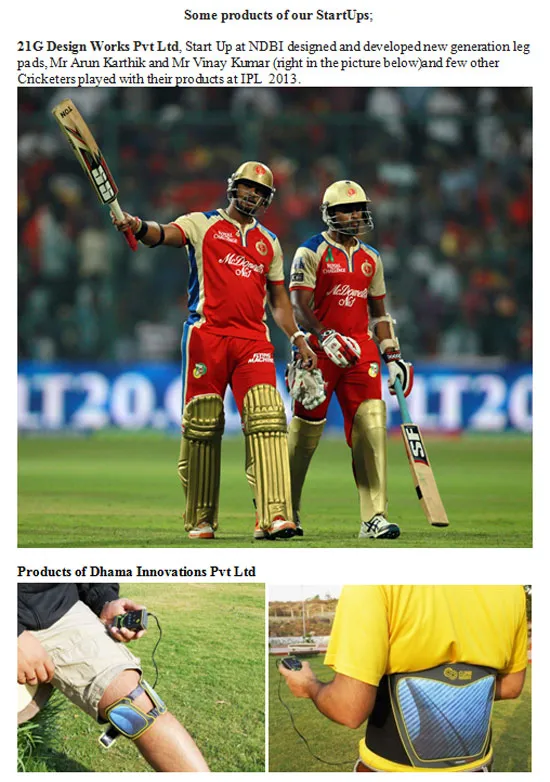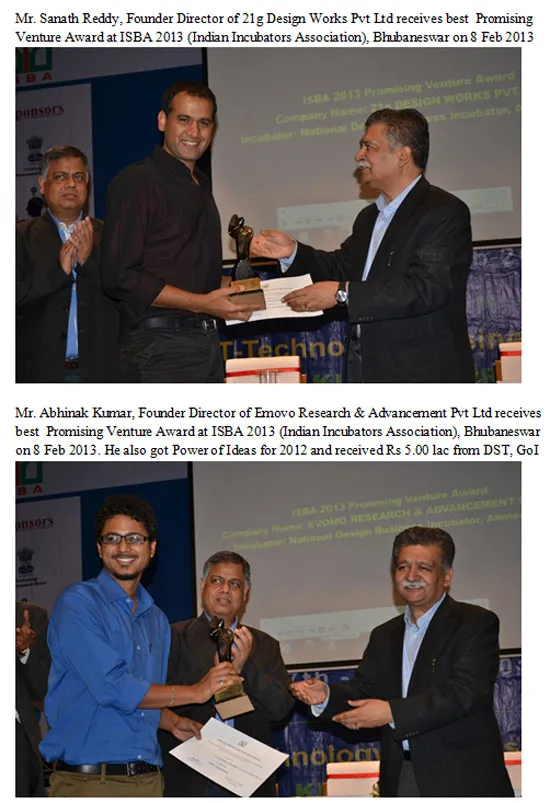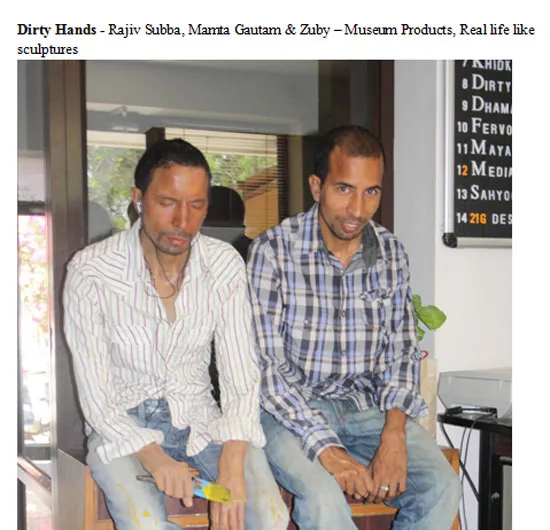[Startup Hatch] National Design Business Incubator, Ahmedabad: Breathing Design Into 50 Startups
[ This article is part of the series called Startup Hatch, about incubators and accelerators in the startup ecosystem. ]

Mahesh Krovvidi is the CEO of the National Design Business Incubator, an initiative of NID, Ahmedabad and supported by Department of Science and Technology, Government of India. He has been a technical, management and industrial design professional for over 33 years, with a career spanning the US and India. Mahesh is well experienced with the diverse industrial and cultural practices of India, Americas and Europe. He graduated with an M.Tech in production engineering from IIT- Bombay and B.Tech in Mechanical Engineering from Regional Engineering College, Warangal. Mahesh was previously with PriceWaterhouseCoopers and Deloitte, specialising in product and systems design, change management and public design.
He turned around the NID incubator from two ‘designepreneurs’ to 37 startups today employing more than 140 employees. He also manages a $2.5 million venture-ready fund for startups at the incubator, supported by the Department of Industrial Policy and Promotion, and Ministry of Commerce and Industries. He is closely associating with National Innovation Council led by Sam Pitroda, to identify and plan design innovation centres in India.
He is an expert member of the India Design Council, constituted by ministry of commerce and industries and was a screening committee member for three years of TePP (Technopreneur Promotion Program), a national level program promoted by Department of Scientific & Industrial Research. Mahesh joins us in this exclusive interview on the role of design in product startups, their pipeline in the innovation ecosystem, and the importance of alliances for startup acceleration.

YS: What was the founding vision of your incubator, and how is it supported?
A: National Design Business Incubator (NDBI) is a design-focused incubator. It is an initiative of the National Institute of Design which has been offering design education for the past 52 years.
Every product or service which is to be used by humans has to be designed for ease of usability and functionality with ergonomics related to the target user group keeping in mind the personal choices as well. This requires a product / service to be designed differently for diversified cultures as well as climatic conditions, which is often ignored by technology product developers. For example, a choice of car colour in Punjab would be different in Bengal, clothes/ apparel used in Delhi would be different from Kerala; shoes form and sizes are very different from northeast India to the south. The tea served in UP is different way from that of Tamil Nadu.
That is the space in every product/service where intervention is needed by designers, and that is the purpose of the design incubator, NDBI.
DST, Ministry of Science & Technology, has supported NDBI under the scheme TBI-Technology Business Incubators. We have received TDB Seed Fund and also from the DIPP, Ministry of Commerce and Industry, Government of India to support the incubation seed fund under the name of Venture Ready Fund (VRF).
We are financially sustainable since 2010 with our revenues to operate our incubator. We have partnered with design incubators from Europe for supporting the incubation and incubatee exchange scheme. We have also partnered with incubators in Ahmedabad to support each other.

YS: What would you say are the Top Three opportunities for Indian startups?
A: 1. India has a young, large working class population with growing buying capacity and adapting to global trends.
2. There is good mobile penetration in urban and rural India, and active social media networks.
3. CSR (corporate social responsibility scheme) introduced in this year’s budget is a boon for incubators to support startups.
YS: What are the key challenges faced by startups in India, and how can you help bridge the gap?
A: Products / services from startups are not readily accepted against established brands for trust, quality and service. Commercialisation of new products and services is not easy, and there is long gestation which a startup cannot sustain. There is also a lot of bureaucracy in the country. Investors (angels and VCs) may not have enough domain knowledge to foresee the opportunity, and they go by only proven business sectors. Incubation support is not comprehensive and seed funding is not timely and smooth.
Through incubator associations like ISBA we can work with industry, angels/VCs and government. We feel startups under incubator schemes should be exempted from state and municipal regulatory requirements for at least for five years.

YS: What is the selection criteria for startups in your incubator?
A: We look for passion of the founder/s, and commitment to take to market with patience. The startup should have good understanding of the targeted market and users, and a good team with balanced skills of product/service, business development and financial management. They should also have an innovative business idea with scalable business markets, preferably the global market.
YS: What support and services do startups receive in your incubator?
A: We provide air conditioned office space with furniture and infrastructure of computer workstations, laser colored printers, telephone, fax and courier service; along with office secretarial services, conference rooms to interact with clients, employees, future employee recruitments. Startups can also avail of our legal services, company incorporation services, accounting and book-keeping services. Furthermore, we provide IPR/patenting services, branding and web/logo design services. As for students, startups can get student interns as support from technical colleges and business colleges, and projects support.
Our other support covers design clinics, match making and team building, innovators grants from DSIR scheme TePP/ PRISM, and showcasing of products for commercialisation under Design Idea Fair – with further services covering seed fund support as well as facilitating of angels and VCs.
YS: What kinds of IP are being created by your startups?
A: Our startup companies have filed 16 patents in India, US and other countries. One US patent is already granted. Four design registrations were granted, as well as two copyrights and trademarks.
YS: How would you differentiate from the other incubators in the field?
We are the only design incubator in the country out of about 64 incubator supported by DST and another 50 incubators supported by DBT and DIT. Every product and service has to go through design interventions for usability and human factors design, so that products and services will be accepted successfully by user groups.
YS: What would you define as success for your incubator?
A: That would be successful exists who make good revenues and generate employment.
YS: How do you compare and contrast India’s incubators with that of other countries like US and China?
A: The US incubator ecosystem is well established and mature. They have very good accessibility of investors, and anactive and dynamic market with consumers who look for innovative products. There is less bureaucracy and very simple and quick incorporation of business regulations and services. All these are simply absent in India.
In China, incubators are well supported by the federal government, state government and local governments with highly subsided infrastructure and service. In Shanghai, I have seen that incubator parks are established in terms of hundred square kilometers, where in India even SEZ for established industries is only in acres.
YS: What are your plans for the coming 3-5 years with respect to new startups?
A: To spread to various sectors, NDBI is working with joint incubator schemes with following organisations and locations: Central Leather Research Institute (CLRI, Chennai) - footwear and leather accessories design (LAD); All India Institute of Medical Sciences (AIIMS – Delhi) - medical devices and healthcare equipment design; auto manufacturers hub with a private organisation (Manesar, NCR) - transportation & automobile design; National Academy of Agriculture Research and Management (NAARM, Hyderabad) - agricultural, veterinary equipment and food packaging design.
We are also planning to establish incubator offices in China, US, Europe and Dubai/Singapore in the next 3-5 years.
YS: How many companies did you start off with, and which ones do you have now?
Since 2007 we have exited 17 companies and we have 30 start ups under incubation, both physical and virtual. They are briefly described in Table 1.
Table 1: Startups in the Pipeline at NDBI
YS: What are your recommendations to the startups and entrepreneurs in our audience?
Work out clear a global market strategy, and a scalable business plan. Work with passion and with balanced team. And enjoy entrepreneurship!
[Follow YourStory's research director Madanmohan Rao on Twitter http://twitter.com/MadanRao]


![[Startup Hatch] National Design Business Incubator, Ahmedabad: Breathing Design Into 50 Startups](https://images.yourstory.com/cs/wordpress/2013/06/ndbi0.jpg?mode=crop&crop=faces&ar=16%3A9&format=auto&w=1920&q=75)




